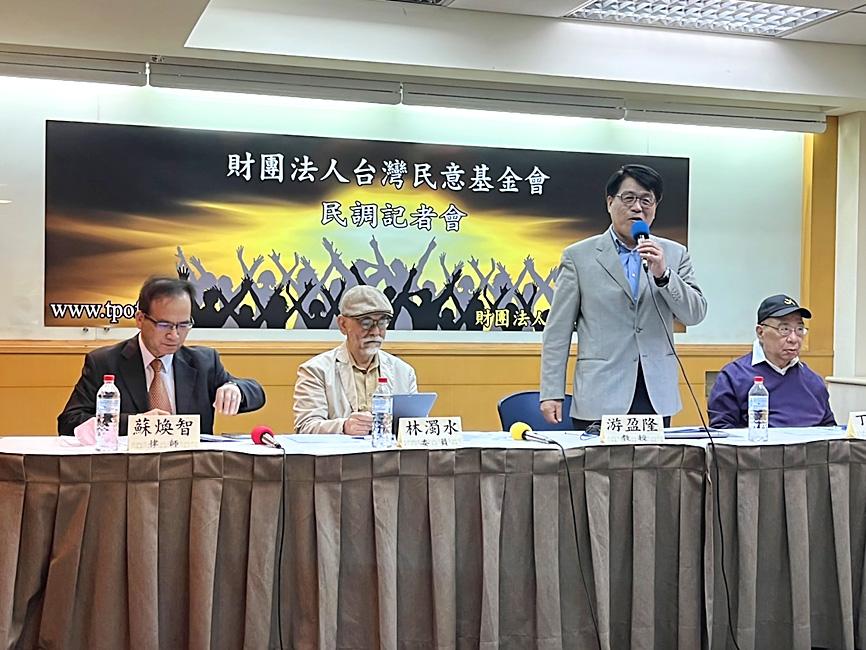As Ukrainians defend their country from a Russian invasion, an overwhelming majority of Taiwanese responding to a Taiwanese Public Opinion Foundation survey said they think Taiwan’s mandatory military service is too short.
The survey — conducted by the foundation on Monday and Tuesday last week — found that 76.8 percent of respondents aged 20 or older disapproved of Taiwan’s mandatory military service, with 75.9 percent saying that it should be lengthened to one year as a measure to shore up the country’s defenses against Chinese aggression, foundation chairman Michael You (游盈隆) told a news conference.
In Taiwan, combat units are comprised of volunteers, while men of military age complete a mandatory four-month boot camp, leaving as military reservists.

Photo: Chen Yu-fu, Taipei Times
Most respondents disagreed that the US would fight to protect Taiwan if China invades, including 26.5 percent who somewhat disagreed and 29.4 percent who strongly disagreed.
Seventy-eight percent of respondents disagreed that Taiwan’s military could deter Chinese aggression on its own, while 59.7 percent expressed concern that Taiwan might need to fight invaders alone, as Ukraine is doing.
Respondents largely supported Taipei’s participation in international trade sanctions against Russia, with 64.4 percent approving and 23.6 percent disapproving.
The survey, which collected 1,077 valid samples by landline telephone, has a confidence level of 95 percent and a margin of error of 3 percentage points.
Speaking at the news conference, former Democratic Progressive Party (DPP) legislator Lin Cho-shui (林濁水) slammed President Tsai Ing-wen’s (蔡英文) administration over “lukewarm support” for proposals to bolster conscription.
Tsai’s silence on conscription and Minister of National Defense Chiu Kuo-cheng’s (邱國正) comment that he “looks favorably” on extending it fall short of the leadership being shown by Ukrainian President Volodymyr Zelenskiy, he said.
The president and defense minister’s attitude puts them at odds with public opinion at a time when Taiwanese are ever more alert to Chinese aggression, Lin said.
Of the survey respondents 51.8 percent approved and 33.4 percent disapproved of Tsai’s performance, while 47 percent approved and 42.6 percent disapproved of Premier Su Tseng-chang’s (蘇貞昌) performance.
With an approval rating of 36.1 percent, the DPP remained the most popular political party, followed by the Chinese Nationalist Party (KMT) at 14 percent, the Taiwan People’s Party at 13.5 percent, the New Power Party at 2.8 percent and the Taiwan Statebuilding Party at 2.5 percent.
University of Taipei industrial management and marketing professor Timothy Ting (丁庭宇), a former Taipei deputy mayor, told reporters that conscripts should serve two years and receive the same pay as active-duty soldiers.
Additional reporting by Chen Yu-fu

Conflict with Taiwan could leave China with “massive economic disruption, catastrophic military losses, significant social unrest, and devastating sanctions,” a US think tank said in a report released on Monday. The German Marshall Fund released a report titled If China Attacks Taiwan: The Consequences for China of “Minor Conflict” and “Major War” Scenarios. The report details the “massive” economic, military, social and international costs to China in the event of a minor conflict or major war with Taiwan, estimating that the Chinese People’s Liberation Army (PLA) could sustain losses of more than half of its active-duty ground forces, including 100,000 troops. Understanding Chinese

The Ministry of Foreign Affairs (MOFA) yesterday said it is closely monitoring developments in Venezuela, and would continue to cooperate with democratic allies and work together for regional and global security, stability, and prosperity. The remarks came after the US on Saturday launched a series of airstrikes in Venezuela and kidnapped Venezuelan President Nicolas Maduro, who was later flown to New York along with his wife. The pair face US charges related to drug trafficking and alleged cooperation with gangs designated as terrorist organizations. Maduro has denied the allegations. The ministry said that it is closely monitoring the political and economic situation

UNRELENTING: China attempted cyberattacks on Taiwan’s critical infrastructure 2.63 million times per day last year, up from 1.23 million in 2023, the NSB said China’s cyberarmy has long engaged in cyberattacks against Taiwan’s critical infrastructure, employing diverse and evolving tactics, the National Security Bureau (NSB) said yesterday, adding that cyberattacks on critical energy infrastructure last year increased 10-fold compared with the previous year. The NSB yesterday released a report titled Analysis on China’s Cyber Threats to Taiwan’s Critical Infrastructure in 2025, outlining the number of cyberattacks, major tactics and hacker groups. Taiwan’s national intelligence community identified a large number of cybersecurity incidents last year, the bureau said in a statement. China’s cyberarmy last year launched an average of 2.63 million intrusion attempts per day targeting Taiwan’s critical

AGING: As of last month, people aged 65 or older accounted for 20.06 percent of the total population and the number of couples who got married fell by 18,685 from 2024 Taiwan has surpassed South Korea as the country least willing to have children, with an annual crude birthrate of 4.62 per 1,000 people, Ministry of the Interior data showed yesterday. The nation was previously ranked the second-lowest country in terms of total fertility rate, or the average number of children a woman has in her lifetime. However, South Korea’s fertility rate began to recover from 2023, with total fertility rate rising from 0.72 and estimated to reach 0.82 to 0.85 by last year, and the crude birthrate projected at 6.7 per 1,000 people. Japan’s crude birthrate was projected to fall below six,